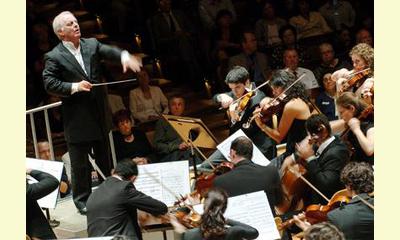|
|
Daniel Barenboim: Music as the Universal Language
un articulo por Kiki Chauvin
It was with special attention that I watched the television program of Arte on November 15 about Daniel Barenboim, pianist and conductor, prolific, cosmopolitan and engaged. The artist, now an Israel citizen, is unique in holding four passports, one of which is Palestinian, which makes him an example without precedent!

Photo of Barenboïm on the website of the West-Eastern Divan Orchestra
click on photo to enlarge
In 1999 Barenboim co-founded, along with his Palestinian friend Edward Said (since deceased), the West-Eastern Divan Orchestra, which allowed young musicians from Israel, Palestine and neighboring Arab countries to play music together. In the beginning it was just an experiment, but in the course of time, it became a permanent formation with a goal of promoting peace in the Middle East through classical music concerts throughout the world. (See the CPNN article of June 7, 2004, "Peace through music in the middle East")
The second part of the television documentary illustrates the consistency and depth of his engagement. At 70 years of age, Daniel Barenboim has not lost any of his force, and he continues his struggle, armed with music and the cultural exchanges that he promotes. His patience is charged with confidence, as he says, "culture favors contact; it brings people together and enables them to better understand each other."
Another high point of the documentary was the film of his visit and concert in the Gaza Strip last year. In May, 2011, Daniel Barenboim conducted musicians from the orchestras of Berlin, Milan, Vienna and Paris in a concert that was a celebrated political event ! Once again, he showed how music is the universal language, a key that opens doors of questioning and discussion.
Music as a universal language is a lever that facilitates listening to the other; music speaks to the heart and it is capable, with its effects, to open spirits and raise consciousness. Its power also enables it to tame our perceptions to develop the notion of sharing, of mutual respect, and thus mutual tolerance. It does this even for the conflict in the Middle East; despite the difficulty of the situation and the divergent opinions, reconciliation becomes possible. One must accept to know the other and learn to live together.
Daniel Barenboim affirms through all of his engagements, and in their implications, the legitimacy of his approach. He insists as well that we recognize the courage of the musicians that come to play in his orchestra, as they must dare to cross the frontiers of prejudice and conflict.
And as he says so well: "Wherever I am, I always want to get to know my neighbors !"
(Click here for a French version of this article)
|








|
DISCUSSION
Pregunta(s) relacionada(s) al artículo :
What place does music have in the peace movement?,
* * * * *
Comentario más reciente:
:
As of now, there are 33 CPNN articles on this theme, which shows the great extent to which music is the universal language of peace!

|
|









